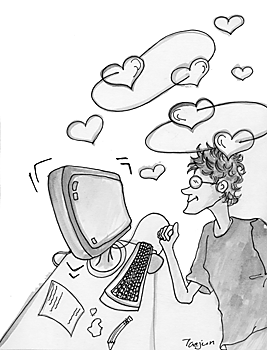
Illustration by Taejun Lim
|
|
By Michael Huston
Arizona Daily Wildcat
Wednesday, November 16, 2005
Print this
If you’re not on Facebook.com by now, then you’re either protesting it deliberately in an attempt to avoid doing what everybody else is doing, or you’re afraid that stalkers will use it to come after you.
What started out as a simple way for university students to connect with one another online has now become a pillar of the college social scene.
Despite the fact that so many of us squander valuable study time in order to be connected to the dynamic social machine that is Facebook, it is in fact a valuable tool in a world that continues to perpetually thirst for information.
As if checking away messages over and over again wasn’t an effective enough method of wasting gross amounts of time in front of a computer, college students now have the option of needlessly adding themselves to yet another group or considering the crucial question of whether to “poke back” the person they don’t know who has previously “poked” them.
This leads to a tangential question about the whole idea of “poking” in general. As Jerry Seinfeld asked, “What’s the deal with that anyway?” A survey of UA Facebook users reveals mixed explanations of just what signal is sent by “poking” someone.
While some see it as merely a silly greeting, others take it as a flirtatious digital gesture meant to suggest the poker’s attraction for the pokee. Still others think of it as a sort of technological slap in the face used to express the resentment or disappointment of the original poker. Perhaps, then, the option to “poke” someone is so great because it can mean whatever you want it to mean.
So, if you “poked” the woman you met at the party the other night hoping to send the message that you’re interested in seeing her again, but heaven forbid you don’t get “poked” back with an invitation for a second date, you can always just say that the original “poke” was nothing more than a friendly digital “hello.”
Nowhere is Facebook’s acquired dominance of social life more apparent than in the wonderfully complicated situations that are collegiate relationships.
A friend of mine announced that she had exciting news recently and instructed me to check her Facebook profile, which would eventually reveal that her “In a Relationship With” section had recently been updated with the name of her new boyfriend.
This leads one to ponder exactly how significant a step it is for a new couple to announce themselves via Facebook. I’m imagining someone suggesting to his or her significant other that they make this crucial social leap forward using a phrase like, “I think it’s time we took our relationship to the next level.”
Besides, with the UA rated in the top 10 places to “hook up,” we should be happy that things like Facebook exist to help us find all those beautiful potential mates. I mean dates.
But funny as it may be to ridicule Facebook, generally overlooked is the fact that its popularity is a direct result of the desire of college students to obtain more information more quickly and from any Starbucks with Wi-Fi.
 |
|
Generally overlooked is the fact that Facebook's popularity is a direct result of the desire of college students to obtain more information more quickly and from any Starbucks with W
-Fi.
|
 |
Although we think it silly and somewhat sad that the tools of the digital age allow people to have “friendships” that consist of little more than instant messages and writing on each other’s “walls,” these same tools allow us to have more social contact with our peers than has ever been possible.
Facebook and other Internet-based personal information tools allow people to offer information about themselves to a wide variety of their friends and classmates, and also to collect information rapidly about other individuals.
Facebook also allows people to communicate with others from different geographic locations. Although complicated scheduling conflicts may prevent you from regularly calling your friend who goes to Florida State University, Facebook provides a way to stay in touch when it’s convenient.
Although the dangers of posting too much information on the Internet should be obvious, the advantage is that it allows users to accelerate the process of getting to know each other.
While I certainly don’t hope that college relationships become entirely electronic, Facebook’s ability to allow students to connect with each other so rapidly and easily means it’s here to stay on the college social scene.
Now get out there and “poke” someone you love.
Michael Huston is a political science sophomore who used Facebook to send out engagement party invitations. He can be reached at letters@wildcat.arizona.edu.
